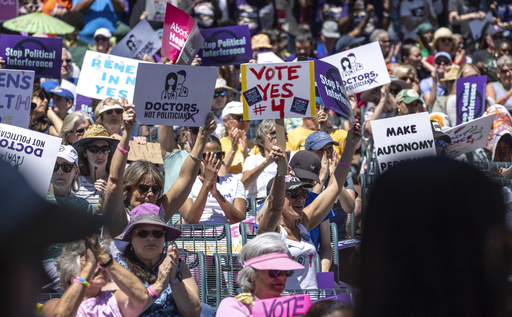
The organizations advocating for ballot measures in nine states aimed at establishing abortion rights in their constitutions have successfully amassed funding exceeding $160 million. This amount is nearly six times greater than the contributions garnered by their opponents, as revealed by a comprehensive analysis of campaign finance data from state entities and the watchdog group Open Secrets.
The financial reports depict a moment in time within the campaign, particularly at this stage where monetary contributions are actively being received. This substantial funding advantage is evident in advertising outlays, with a media tracking firm indicating that proponents have invested over three times more than their opponents in advertising across television, streaming platforms, radio, and online.
Since the 2022 U.S. Supreme Court decision that annulled Roe v. Wade, responsible for dismantling a nationwide abortion right, supporters of abortion rights have triumphed in all seven ballot initiatives put forth to voters. This shift has allowed for increased bans and restrictions that are currently being enforced in a majority of states governed by Republicans.
Florida has emerged as a focal point in the current abortion ballot measure campaigns, amassing more than $75 million by supporters, in contrast to $10 million raised by opponents. This total represents nearly half of all funds collected nationally. The Florida Republican Party is also leveraging additional financial support from various corporations to discourage voters from passing the measure. Even so, advocates maintain an advertising lead, spending $60 million compared to the opposing side’s $27 million.
The proposed amendment seeks to revoke Florida’s prohibition on most abortions after six weeks of pregnancy, a law enacted by Republican Governor Ron DeSantis, which took effect in May. DeSantis’ administration has taken measures that may hinder the campaign promoting the amendment. Notably, Florida’s ballot measure regulations require a significant 60% voter approval for passage, rather than a simple majority.
In contrast, South Dakota reveals a significant funding advantage for anti-abortion groups, who have raised approximately $2 million, compared to $1 million by abortion-rights advocates. A recent development last week saw the abortion-rights organization Dakotans for Health secure a $540,000 contribution from Think Big America, a fund established by Illinois Governor Jay Pritzker, aiming to enhance advertising visibility in what is anticipated to be a tight race.
Prior to this, national abortion-rights organizations, including Planned Parenthood Federation of America, had largely overlooked South Dakota as they felt the scope of the ballot measure was insufficient. The proposed measure would permit restrictions on abortion after the 12-week mark, provided they relate to the woman’s health. Advocates believe they find themselves in a precarious position, being too central to either side of the abortion debate.
On the anti-abortion front in South Dakota, messaging primarily focuses on depicting the amendment as overly radical. This campaign received bolstered support with newfound funding, allowing them to amplify their messaging.
In Nebraska, the landscape is influenced by two opposing ballot measures: one advocating for abortion access until viability (post-20 weeks) and another endorsing restrictions after the first 12 weeks, which echoes the current legal framework while also allowing for stricter limits. The fundraising efforts are skewered toward the restriction advocates, boasting at least $9.8 million, with a notable family contributing significantly to that total. Conversely, proponents for broader access have raised around $6.4 million.
Elsewhere, the opposition to abortion rights manifests as comparatively muted in states like Arizona, Colorado, Missouri, Montana, and Nevada, where they have collectively raised under $2 million, while abortion rights supporters have each collected at least $5 million. Each state’s ballot question comes with unique situations.
In Missouri, an amendment would potentially dismantle the existing total abortion ban with limited exceptions, whereas Arizona seeks to roll back a 15-week abortion ban to allow for abortion up to fetal viability. Meanwhile, Colorado already permits unrestricted access, and Montana allows until viability.
Fundraising efforts in Maryland and New York have been tepid, although financial input from Pritzker’s fund is reported to be directed towards Maryland. In New York, a ballot initiative does not directly address abortion, but it aims to prevent discrimination based on “pregnancy outcomes and reproductive healthcare and autonomy.”
On the national scale, funding dynamics appear to favor liberal advocacy groups. The Fairness Project, which promotes progressive issues, has committed $30 million towards this year’s abortion amendments with $10 million recorded in financial disclosures so far. Several abortion-rights groups have also contributed upwards of $5 million, whereas no single entity on the anti-abortion side has matched such contributions.
Notably absent in this year’s funding landscape are groups that significantly opposed a previous abortion rights measure in Ohio. The Concord Fund, associated with conservative political networks, has not shown notable financial activity this year. Meanwhile, Susan B. Anthony Pro-Life America remains focused on the presidential race, redirecting its resources rather than engaging in abortion ballot measures, emphasizing their commitment to spending $92 million across eight states during the presidential campaign.
